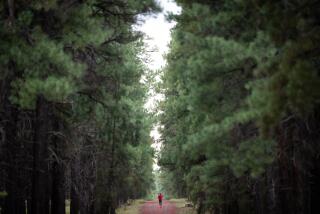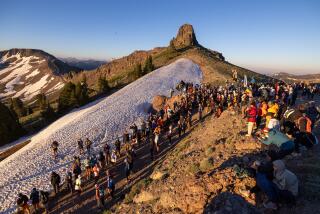Running the High Country--It Has Been a Religion in Jemez Pueblo : Al Waquie, 33, Has Few Peers in High-Altitude Racing Because He Has Run in the Mountains of New Mexico All His Life
- Share via
JEMEZ PUEBLO, N.M. — He runs like the wind, like the jack rabbits, antelope, deer, wild cattle and wild horses he chases.
He will be 34 next month and has no intention of slowing down.
“I’m as fast now as ever. I’m at my peak. I never think of quitting,” says Al Waquie (Wha-key) of his training runs at an elevation of 7,500 feet in the Rocky Mountains not far from the Continental Divide.
It is sundown. Waquie is in training, running 14 miles in the high country as he does every evening after putting in a full day as a roofer in Albuquerque, 50 miles to the southeast.
Below, stretched out in scenic splendor, lies a vast uninhabited valley embracing a tiny mile-high Indian village. A winding dirt road leads to the village in the shadows of a blazing redstone mesa.
Jemez (Hay-mez) Pueblo is a village of runners.
Running is a tradition, a way of life since prehistoric times in Jemez Pueblo, Al Waquie’s home, where 2,000 Indians speak English and the ancient Towa, a language spoken nowhere else.
“Running is a religion with my people,” said Waquie, who stands a wiry 5 feet 3 1/2 inches and weighs 108 pounds. “It is part of our centuries-old spiritual ceremonials. It is part of my soul, my reason for being.”
Waquie is “King of the Mountains,” the best of America’s high-country runners. His Indian name is Sho Nee Toe, the name of his father’s favorite hunting ground. His father hunts wild turkey, deer and bear at Sho Nee Toe to fill the family larder.
For seven years now, Waquie has won the torturous nine-mile La Luz Run to the summit of 10,678-foot Sandia Crest, the mountain towering over Albuquerque.
At 14,110-foot-high Pikes Peak, he holds the record for the 28-mile race to the summit and back. It’s the highest race in the country. He set the record, 3 hours 26 minutes 17 seconds, in 1981, running the grueling race eight minutes faster than it had ever been run.
He won at Pikes Peak again in 1982. In 1983, the heat did him in. He missed the race last year but plans to run it again in August.
Waquie’s modest adobe home here is filled with trophies, most of them for winning high mountain races. There are three on one shelf from one of the most unusual races of all, up the 1,575 steps from the bottom to the top of the Empire State Building. Waquie won the Empire State Building race this year for the third straight time, in record time.
“The longer I run, the better I get,” he said. “The higher I run, the better I am.
“I love to run alone in these sacred mountains above my village. The mountains keep me going. The spirits of all the great Jemez runners who ran here from the beginning of time keep me going. The figures on the mountain keep me going.”
He points out rock and ridge configurations. Eagle Mountain is so named because it resembles an eagle. There is the outline of a racing horse on the side of a cliff in the distance, another of a coyote, another of a deer.
“The mountains up here are alive with wildlife,” he said. “I chase everything, jack rabbits, wild cows, wild horses, deer, elk, and antelope. Chasing the wild animals is a big part of my training.”
He races up the side of a steep mesa. He runs along trails used by Jemez Pueblo Indians hundreds of years ago as they, too, chased animals.
Waquie has run the Boston Marathon and other long-distance races at lower elevations but doesn’t do nearly as well as he does when he’s in his element at elevations 7,000 feet to two miles up and higher.
“I tell Frank Shorter, Billy Mills and the great marathoners of today they can have the sea-level races, that the King of the Mountains will take care of the running in the high country,” he said, laughing.
He believes someday there will be a mountain race in the Olympics and is sorry that if it happens, it will probably happen too late for him.
He hopes to compete in high mountain races later this year in Switzerland, races he hasn’t been able to afford to attend, so far. “If I can find a sponsor, I’ll be there,” he said.
In Jemez Pueblo the name Waquie is synonymous with running. Al’s father Felix, 67, won the village’s annual corn race six years in a row in the 1930s and ‘40s. In this long-distance run, Indians race from the pueblo to the mountains and back.
One runner starts 50 yards ahead of the pack, carrying a bundle of cornstalks. When another runner takes the lead, he grabs the cornstalks and tries to carry them to victory.
“My wife and I had 10 children,” Felix Waquie said. “When Al came along, almost from the time he took his first steps, I knew he would be the one to carry on the family tradition. He took my place as I took my father’s place, and my father took my grandfather’s place, and fathers and grandfathers before them.”
Waquies have been outstanding distance runners for many generations. Al is a bachelor, though, and there is no new generation to take his place.
The Gachupins are another great family of runners in Jemez Pueblo. Steve Gachupin won the Pike’s Peak race six times in the 1960s. In the late 1800s, Steve’s great-grandfather, Pablo Gachupin, was the hottest runner in the Rockies.
Lucas Toledo, 79, the grand old man of Jemez Pueblo runners, who won the Pikes Peak senior division when he was 66, still runs every day in the sacred mountains above the village. During a reporter’s visit to the pueblo, Toledo was out gathering pine bows to brew a traditional tea that all runners in the village drink.
Throughout the year, special races are held in the dirt streets of the village, some for Jemez Pueblo Indians only, others, like the annual autumn harvest race, for Indians from all over the nation.
Running is traditional with many Indians, but of all the Indians, those from Jemez Pueblo have been renowned for centuries as the mountain runners.
Two boys, Jay Pecos, 7, and Barton Chinana, 8, were running by Al Waquie’s house when the great mountain runner returned home from his training.
“Where are you boys running to?” Waquie shouted.
“To the windmill and back. We run it every day. It’s two miles to the windmill,” Jay yelled.
Added Barton: “We’re in training to take your place.”
Shouted Waquie as the boys disappeared around the corner, “Keep at it. Don’t ever stop.”
More to Read
Sign up for Essential California
The most important California stories and recommendations in your inbox every morning.
You may occasionally receive promotional content from the Los Angeles Times.













